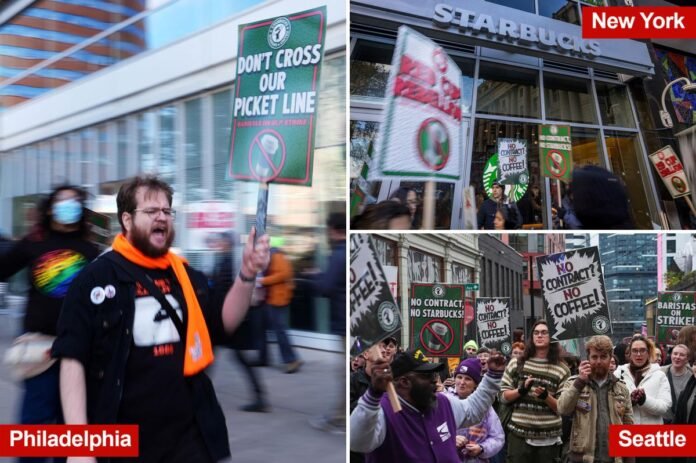Starbucks workers have taken a stand, with the union‑led strike now covering more than 30 stores across the United States. The latest picket line in Albany, New York, followed a wave of protests that started last week on Starbucks’ “Red Cup Day.”
The strike began when baristas in Albany’s New Scotland Avenue store walked out Thursday. That same day, top officials in the new New York City administration, led by mayor‑elect Zohran Mamdani, joined a picket line outside a Manhattan Starbucks. Mamdani called for a boycott of the chain, tweeting that fighting “unfair labor practices and a living wage” is part of making NYC affordable.
Mamdani’s campaign, which is already pushing for a citywide living wage, praised the baristas. “We are their partners in the fight to live in this city with dignity,” he said. His coalition, including former SEC chair Lina Khan and deputy‑mayor pick Dean Fuleihan, also voiced support for the striking workers.
In upstate New York, over a dozen baristas held signs early Thursday, saying Starbucks management is slow to negotiate a new contract. The Albany workers are the first in the state’s capital region to join the strike, according to local news. Since Thursday, the walkout has spread to more than 25 cities, including Cleveland, Memphis, and Springfield, Missouri, with at least 1,000 workers participating.
Starbucks Workers United, the union behind the action, launched the strike on Red Cup Day, the holiday season promotion that gives out reusable cups with every coffee order. “We’ve been clear on what baristas need: better pay, fairer hours, and resolved legal issues,” the union said. “Show us new proposals that address these needs, and we’ll come back to the table.”
The coffee giant says disruptions are minimal. A spokesperson told reporters that Starbucks is ready to resume negotiations once the union returns to bargaining.
The union started forming during the pandemic, with the first group of baristas in Buffalo, New York forming Starbucks Workers United in August 2021. Today the union represents more than 14,000 workers in 45 states and 640 stores. Starbucks owns about 10,000 company‑owned shops in the U.S., but only a small percentage—roughly 5%—are unionized. Most of the company’s 7,000 licensed stores in airports and grocery stores are not covered by current union campaigns.
Starbucks and the union have tried mediation in recent years, but disputes over stalled contract talks have led to work stoppages lasting hundreds of days in nearly 200 stores. The union also accuses management of firing pro‑union employees and shutting down stores with active labor campaigns.
Former CEO Howard Schultz has argued that employees already receive sufficient benefits and wages, but baristas say the current pay and contract terms fall short of a living wage.
The strike expansion and the mayor‑elect’s boycott call underscore a growing push for better labor rights among Starbucks workers. The rollout of protests, the focus on a clear manifesto, and the heightened media attention could shape the next chapter in this long‑running conflict.
Stay informed on all the latest news, real-time breaking news updates, and follow all the important headlines in world News on Latest NewsX. Follow us on social media Facebook, Twitter(X), Gettr and subscribe our Youtube Channel.



